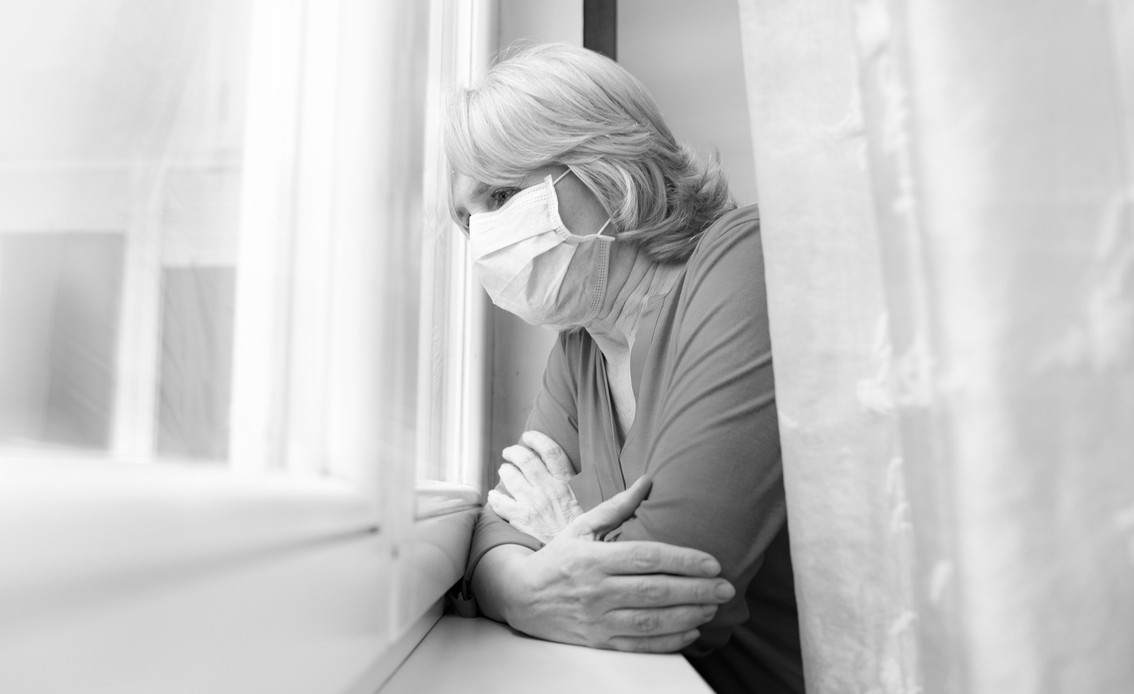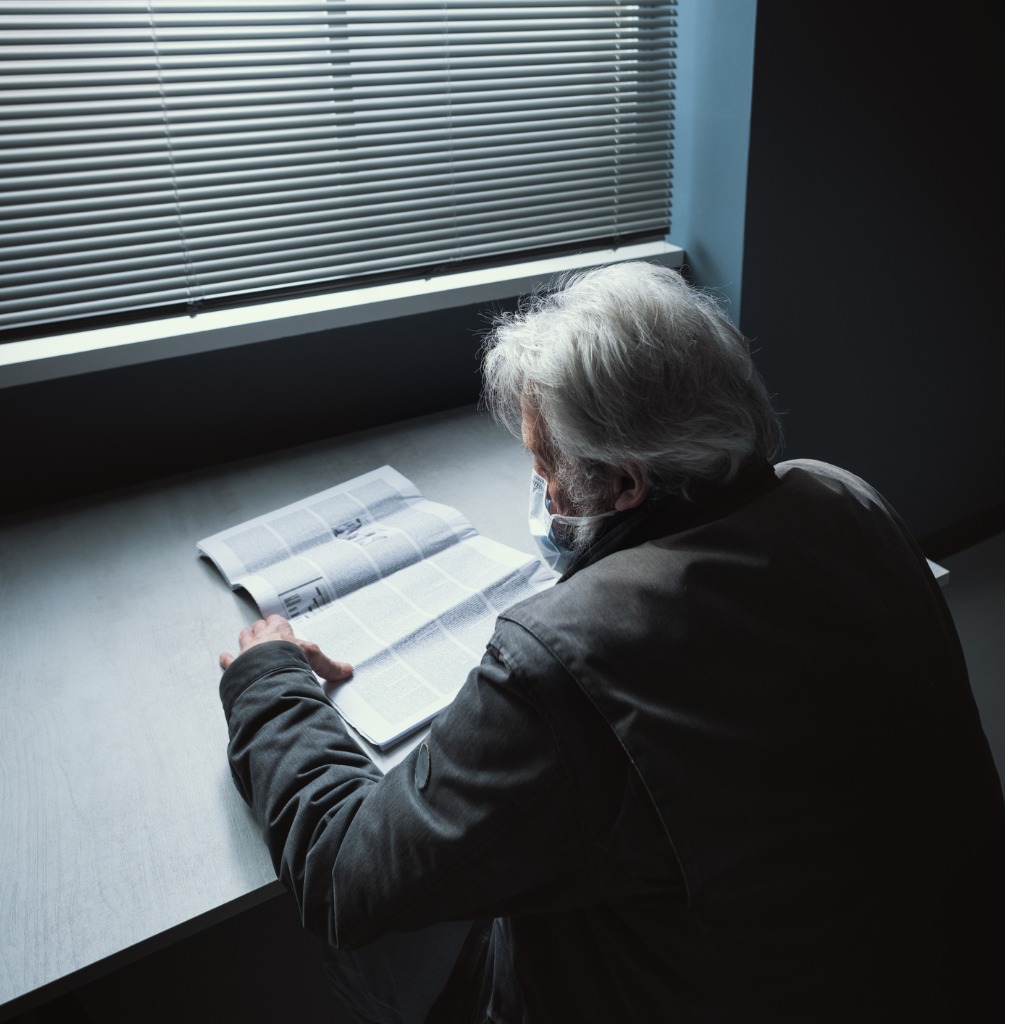
Coronavirus and the elderly: Stories of hopelessness, solitude, isolation, and despair
Editor’s note: The Coalition on Human Needs recently asked our online supporters how coronavirus has affected their families. Hundreds wrote in to share their stories. This is one of a continuing series of stories about the personal effects of the pandemic – and what must be done to help people in need. If you have a coronavirus story you would like to share, please click here.
When we at CHN asked our online supporters to share their stories about the coronavirus pandemic, we heard from a number of elderly people with a wide range of concerns.
Some expressed a sense of hopelessness, solitude, isolation, and despair. Others feared that if they get sick, they will not be treated and will instead be sacrificed for younger patients who are deemed more likely to survive. Others still worry about an ongoing lack of testing and whether the resources will exist for them to be able to access treatment.

All images are for illustrative purposes only.
Candy of Columbus, Ohio said she and her husband are both over 70 and have pre-existing conditions. “I have leukemia and can’t go out so my husband, who has diabetes and high blood pressure, has to go to the store, etc. I am worried every day about what could happen to us. We have 17 grown grandchildren and 10 great-grandchildren and we would like to be around for them all.”
Gail, 67, of Gilbert, Arizona provided part-time child care until recently. She also picked up her grandson from school every day, an interaction she looked forward to. Both of these things have been taken away – Gail has a chronic lung infection, making it all the more imperative that she observe social distancing, even though she really needs the money that child care provided.
“So, here I am, stuck at home other than an occasional trip to the grocery store, with plenty of time to think about how things will evolve,” she writes. “And it is lonely. I do a lot of reading, but with the library closed, I am running out of books. I try to limit watching TV, because I don’t find much of interest other than the news, but too much of that isn’t good. It can get frightening….I realize I have much to be thankful for. I am blessed in many ways. But this pandemic is such a different situation. Nothing like it ever before. The world is suffering. Is there light at the end of the tunnel?”
Amy of San Diego, California lost her part-time job and says she is ineligible for unemployment insurance. Her only income is her SSI check. “No one in California with the very high cost of living can subsist on this,” she says. “My savings from 40 years of employment dropped by $50,000. I will never be able to recoup that money in my lifetime. My husband died, my father is 88 with a very modest income and very few savings and my brother works a minimum wage job and has no savings. I’m terrified and feel totally hopeless.”
Margaret of McMinnville, Oregon describes herself as a “very senior senior” who lives by herself and is about to turn 98. She gardens, does housework, and, until the pandemic, was socially active with local groups – but no longer. Now she isolates at home, no human traffic in or out. “So the final flame of my life is to flicker contact-less, hug-less, like an abandoned pet that has been jettisoned as useless? A month ago I was the honored matriarch of this branch of the family tree. Now I am defined by government agencies as expendable due to advanced age plus lack of economic productivity. Somewhere a freezer truck awaits the arrival of my body because the local mortuary is overflowing and I can’t be buried in the family plot because grave-diggers, categorized as non-essential, must stay at home.”
Fear of abandonment due to age is a sentiment a number of CHN online supporters shared. Robin, a 71-year-old resident of Bakersfield, California who is dealing with disabilities, cares for a 30-year-old autistic grandson. “I do not expect to survive, and I am gravely concerned about my grandson’s future,” she says. “My neighbors try to help us when they can, but I hesitate to ask – they are no better off than we are medically or financially. We are the people that some in business and government talk about dying as though it will be a good thing for the country and the world, as though we are criminals sucking up their rightful gains, as though our survival steals from them, as though I didn’t earn my Social Security and Medicare every day of my working life, as though my sweet boy had asked to be born autistic. We in this modern world like to call ourselves civilized. We like to say we have made great progress. This is a lie.”

We asked our online supporters to share their COVID-19 stories, and we heard from a number of elderly people with a wide range of concerns.
June of Bradenton, Florida used to watch President Trump’s daily coronavirus briefings on TV but “had to stop” when she and her partner realized the President was not being truthful. “Even going to the grocery store scares us,” she said. “We are 77, in excellent health, but it sounds like if we do get the virus, they will give equipment needed to survive to younger folks. This no longer feels like America. We are very scared.”
And a number of respondents expressed concern and anger about a lack of COVID-19 testing and also wondered whether there would be adequate treatment. Wilson, 73, of Placerville, California said he developed symptoms resembling COVID-19 in mid-March. “I self-quarantined for 14 days,” he said. “I was sick for over one week, but recovered. I asked my doctor for a test. I was told ‘no.’ I did not qualify. I must be tested for antibodies when tests are available so I know if I was positive.”
Roy of La Verkin, Utah said his 72-year-old wife came down with a slight fever, headache, violent cough and chills. “The doctor said because they had no test kits he could not test for COVID-19,” Roy explained. “He was sure she had pneumonia, gave her antibiotics, and sent her home. We live in fear not knowing what she really has and no one even checks up on her.”
Adds Perry of Salem, Oregon: “There are not enough medical personnel and not enough supplies to provide testing and/or treatment for any of us, should we fall ill. We are hiding out, prepared to die without treatment. Welcome to America, land of the free (unless you’re sick) and home of those too afraid to face the truth.”
Not every elderly person who shared their story with CHN reported feelings such as hopelessness, solitude, isolation or despair. Ron of Asheville, North Carolina described himself and his spouse as an “older, retired couple” who are active and have sufficient food, financial resources, and “a home that needs a little work.”
“We are very fortunate,” he says. “I am involved with a number of groups working on social justice issues. We are trying to get used to the ‘new normal,’ but it is a challenge. Again, we recognize how fortunate and blessed we are, and are so thankful for all the people on the front lines doing the work to respond to the pandemic and keep us safe.”

